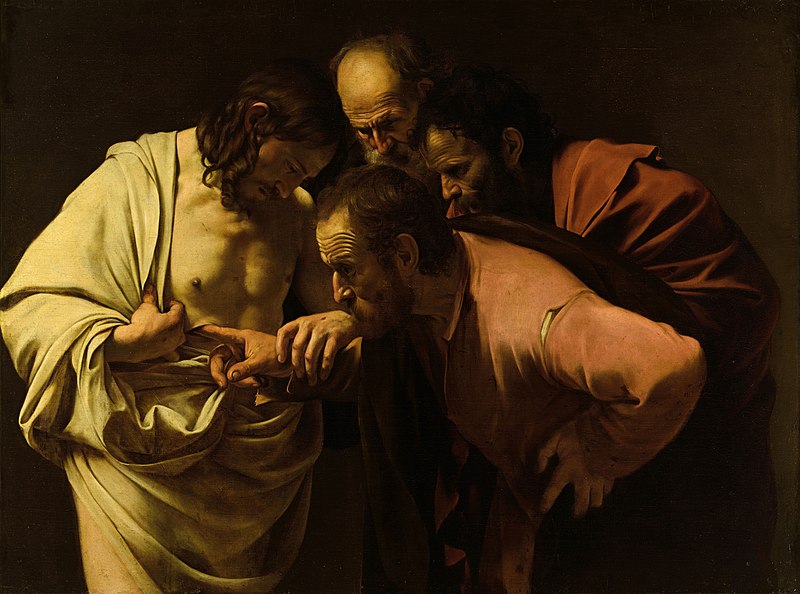
Caravaggio (Italian, 1571–1610). Incredulità di San Tommaso. 1602.
Oil on canvas, 42 × 57 in. (107 × 146 cm). Sanssouci, Potsdam
GRAVEN IMAGE by K Hank Jost
…the best way to take all people […] is to take them
for what they think they are, then leave them alone.
—The Sound and the Fury
There will be coffees that are hot, in mugs hastily washed, and too many people all ordering the same thing. Annie’s feeling now that a mimosa would be good. Geoff will have a soda and bitters, but they’ve already talked about all that.
She won’t ask him how church was, but he’ll ask about her day thus far.
She’ll tell him something nice, tell him that she took it real slow and has grown into an appreciation for mornings, that even though her job is remote and no one’s keeping much of an eye and she could live her life basically any way, she’ll say, “It’s just natural, getting up when the sun says you’re supposed to, you know? It just feels like the way things ought to be.”
And he could respond, as before and still lacking the better words to speak less, with something like, “I don’t know, things are really only one way down at the end of it, if you really think about it. There’s a truth to reality that I don’t think reality really shows very well…”
He’ll be coming in hot off the closing voluntary.
The first night they met in person, after weeks of slow-and-missed messages, he’d said that the organist they’d got at his new church is, “a helluva player, Annie. I’ve never heard anything like it. The sound is massive, big, and just too much… in a good way,” and that he thinks music’s got something language and pictures can’t begin to touch.
But now, the priest drolls and Geoff’s got his eyes up at the slack-jawed, cave-faced, perfect bleeding perfection hung above. Geoff’s sending up empty knots of prayer, little clenches of silence around Annie’s name and what all he’s seen:
The more this little saving faith settles, the smaller it gets. The pictures do not mean what they stand for. The immaculate hollow upon which this house is built remains hidden. It is only there because it must be…
Geoff knows that behind the image is the truth of the body it portrays, that behind the body is the truth of the thing it lives for—that the thing behind the body is not life, but light.
The image serves the truth because the image can spread.
Before her, on the bed sheets, lit by this morning’s spill through the window: Three of them. Little fuzz-and-flash polaroids. Taken by the ex, all a cute keepsake game. She’d smiled, twisted, cleaved, and laid wide under the light. Then the phone comes out and he says he wants to be able to see how they are together when they’re apart. These images, and that video everywhere always, are all that remains after the purge, the cease-and-desists, the baroque threats from a friend in law school. She’s young and the flash was on and she’d not realized what was happening.
She can see herself in the mirror on the other side of the room. She turns and shifts her limbs, sucks in her belly, gets the sun on her ribs. She looks better now. Her skin’s not quite so thin, she fits on her bones.
The woman in the pictures and the woman in the mirror even smile different—big and bunching her cheeks red into their peaks, a laugh behind her teeth, eyes closed for the joy of joy. It’s the first thing she’ll hit Geoff with if she sees him coming her way. Hopefully she’ll have finished her cigarette before he arrives. If not, she’ll flick it off and exhale an emptying whoosh before he gets too close.
If he’s there first, waiting on her, she’ll speed up, drop the butt, wave. She’ll smile just the same since she’s got no reason not to and he’d said he’s sworn off everything he was before. He doesn’t drink or smoke or anything at all anymore. And church is weird, but—
“I mean, I don’t know,” he’d said while she lit up outside the bar, “It’s just, I don’t know, you know? I’ve been living too long like I already know and, I don’t know, something happened, clicked or something, and I just don’t—”
“Know?” She interrupted once the ember took, “I get it, man. We let too much shit happen to us too early and have to live it down forever. If you think, or feel like, or have really found something that brings you peace, go with it. No judgement.”
“Never,” he said and took her hand.
Her head found his shoulder and he resisted asking for a smoke.
So, no judgement—He’ll get to the brunch spot at the time they agreed on and take her as she is. She’ll be Annie, the new woman who laughed at his jokes and listened to him try a rant about Christ as the manifest completion of Plato’s system. She’ll be smiling and smell like cigarettes and she’ll ask him about how church was and he’ll say, “I did a lot of praying. Prayed right through the sermon, about a lot of stuff, stuff I’ve been thinking about—and you, of course.”
And she’ll smile and smell like cigarettes and stifle a giggle maybe and say, “You prayed about me? That’s so sweet.”
And he’ll say, “Yeah, well, I don’t know. I pray about a lot of things in my life and I haven’t really been able to stop thinking about you, which is new and nice and—” they’ll hold hands again while they wait for a table. The place is bound to be busy since the people that don’t go to church are just waking up to eat and the people that do go are just getting out of service.
And it is true that Geoff has kept rolling her around in his mind:
That first night they’d managed to end up laying in bed, near enough to naked, warm with each other. His blood was up, and her hand found its way to the rise. He grabbed her wrist, brought her palm to his chest, and said, “Not yet.”
She said, “Okay. I understand,” and scooched closer and warmer.
But he went on: “I just—I’m trying to do some things differently, you know?”
And she said, “I understand.”
But he went on: “There’s a lot of my life I wish I could get back and I just, I don’t know, it’s not you, you know? It’s like, I’m just not trying to rush into anything crazy and I, I mean, if we take it slow then maybe something could be good and, I, I mean, even then that’s rushing, right? Thinking already about what things could be, not what they are, and I’m just trying to get away from what things were, you know? Because they weren’t good. I’ve fucked up a lot and have regrets and I just—”
And she said, “I understand,” and she kept her hand where he’d put it.
And they laid there until she was asleep and he couldn’t rest.
She’s dead-hot and breathing. He’s turgid.
He rose from beneath her.
In her bathroom: Sat on her toilet, phone in hand, thumbing the same words as always into the cracked screen. The usual faces and figures lit up under him, but suddenly she’s there: Caught in the web of fracture, skin thin and bony-shouldered, smeared under harsh light. Sound off but she’s smiling—different than he knows she does now—laughing about what she’s putting in her mouth and the rest of her. Teary-eyed and blooming red, she’s tossed and small beneath the man filming. Her little grin wanes at his words and the smear, the hard hands. She pours and at the end Geoff’s alone, sudden and everywhere over himself.
Thick dribbles over the face and rolled white eyes. Tongue lolling in ravaged hilarity. Arms out in tight, drawn, tendonous surrender. Chest heaving. Exhausted, rattling breath beneath the glimmering sweat shellack. Hair torture tousled and the pierced side gapes for fingers and filling…
The congregation laughs at the priest’s closing joke and all stand for a hymn while Annie returns to the three images spread over her bed. In her head, the rasping voice of her favorite aunt, who’d ten some-odd years ago said, “Take as many pictures of yourself as you can. There’s charms you have now that you’ll never get back. When everything sets to sag and die, the stretchmarks and wrinkles and rolls’ll be all you have to remember your youth by. The only evidence of how perfectly made you were will be—” these three nearly tasteful photos the ex’d taken and that video she’d not known the ex’d posted after she left him.
They all find it and, though he’s dumb enough for God, it won’t be long until Geoff does as well. She can hope though, stacking the photos back together, that he’ll know better than to think what they always think. She can hope, but Annie knows the thing behind the body is not light, but life; knows that life holds the body up before it, and that the body clings to the image of what it was when the light flashed…
She puts the images away in the drawer and finds her phone.
A buzz against Geoff’s thigh just after the congregation’s rise.
The organ blares the hymn’s first verse and Geoff does his best to listen beneath the words: down to the pedaling bass, contrary to the soprano’s climb. The soft stomp of buried time, the uncollapsible hollow behind it all. Inner voice and ornament. But all he can hear is the melody, the face of the thing, the obviation of truth for the sake of its singing. A lazily known, overheard, hollered tune.
(6/10/24)
K Hank Jost is a writer of fiction, educator, and editor born in Texas and raised in Georgia. He is the author of the novel-in-stories Deselections, the novel MadStone, is editor-in-chief of the literary quarterly A Common Well Journal, and edits Reviews/Criticism at X-R-A-Y Lit Mag. His fiction has been recently featured/are forthcoming in Vol.1 Brooklyn, Hobart, Poverty House, BULL, Misery Tourism, Archway Editions Journal, and Serpent Club’s New Writing. He is currently seeking representation/a publisher for his newest novel, Aquarium, while he works on his fourth book, Ordinary Time. As an educator has led workshops at the Brooklyn Center for Theatre Research, been a featured editor at the Barrelhouse Conference 2024, and teaches at Gotham Writers Workshop. He resides in Brooklyn with his partner.
